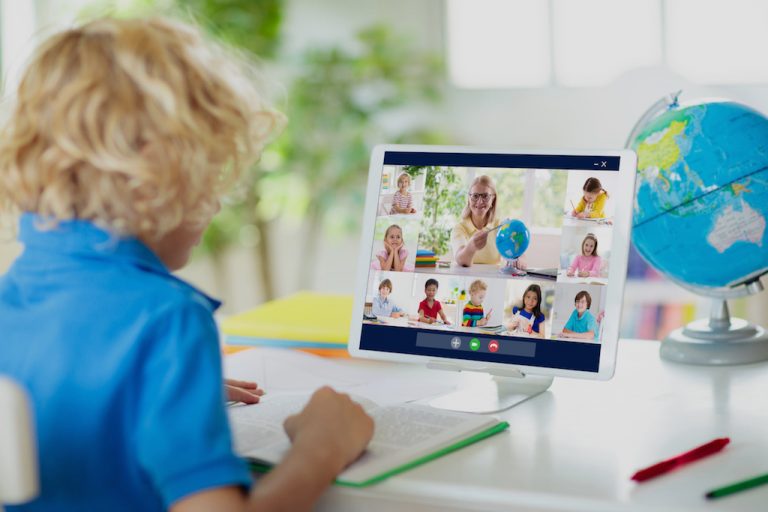By Dr. Jarrod Sadulski
Faculty Member, Criminal Justice, American Public University
With the traditional school year for K-12 students nearing and in view of the coronavirus pandemic, many parents are experiencing a dilemma between whether they should send their children back to brick-and-mortar schools or engage in at-home online learning. According to the
Centers for Disease Control, some of the challenges that
returning to school in the fall of 2020 presents include implementing mitigation procedures such as social distancing, cleaning and disinfection, and the use of cloth face coverings.
In addition, parents and teachers must prepare for the probability of coronavirus cases impacting the larger school community. With the uncertainty of the coronavirus, many parents are likely to place their K-12 children in online schooling for the first time this fall.
As a result, a plan must be established for helping children to succeed in online learning. There was an abrupt change to online learning that impacted millions of students nationwide in the spring of 2020 when the coronavirus pandemic first appeared in the U.S. That resulted in a lot of challenges for students who left their physical classrooms and immediately entered an online learning environment through their local school board.
These challenges included a lack of a cohesive learning plan, technology issues and unfamiliarity with the online platforms used during the remainder of the school year, such as Zoom meetings. However, school boards have now had months to improve their online learning platforms. Parents can assist in improving their children’s online learning experience through preparation and establishing a plan.
Creating and Maintaining a Schedule Is Essential to K-12 Online Learning
For parents placing their K-12 children in online learning this fall, one of the most important strategies is to develop a schedule or routine. Depending on the virtual school and learning platforms that will facilitate online learning, there may be synchronous classroom instruction where the online student logs into the learning platform the same time as the teacher and other students. As a result, a schedule is needed to ensure that students are present during this time and that they have time allotted in the remainder of the school day to complete their assignments and online exams.
An asynchronous platform allows students to complete the work at their pace and when it is most convenient for them. Keeping a schedule or routine for these children is vital. Otherwise, school time can become of secondary importance, causing a decline in the time a student spends learning a subject and adversely affecting the student’s grade.
Both Parents and Teachers Should Monitor Students’ Progress in Online Learning
When students follow a daily routine, it is especially important for parents to monitor their child’s progress in class and ensure that the K-12 student does not experience
academic burnout. If a child does experience burnout in online learning due to the amount of coursework, it may be helpful to make changes to the student’s schedule to allow for flexibility and the inclusion of activities that the child enjoys to break up the school day.
When children are in brick-and-mortar schools, it is easier for teachers to monitor for signs that a child is struggling with a subject or could benefit from additional instruction. But in the absence of in-person classes, frequent communication should be established between parents and teachers in the online learning environment.
Since it is critical that teachers and parents partner together to foster learning in the online environment, a weekly call or email to the teacher is effective. That call or email will help the teacher to understand both the student’s weekly successes and areas for improvement in learning that occurred during the week.
Parents Can Help Children to Grow Accustomed to K-12 Online Learning Technology
Ensuring that students have adequate Internet and computer availability is important. But new online students may often be intimidated by the unfamiliarity of their new online learning platform.
As a result, parents can help their child navigate the online platform more easily. For instance, parents can assist their children in identifying where assignments are submitted, where discussions between the teacher and students occur, and where additional learning resources are available. For students, gaining this insight at the beginning of online learning reduces anxiety about the process and sets the student up for greater success.
Because K-12 online learning
is likely to continue for some time, parents have an increasingly important role in helping students succeed at online learning through helping students remain on track and through partnering with remote instructors. For many parents, this is an added responsibility where parents are also working remotely from home.
In this case, it is important that an organized time management plan is established that ensures that both the student and parent working from home each have the time necessary to meet their responsibilities and that needed computer use is available. Parents who are able to develop an organized schedule to manage their work responsibilities at different times than when their child is completing schoolwork can help foster success in their K-12 student’s education.
About the Author
Dr. Jarrod Sadulski is an associate professor with American Public University in the School of Security and Global Studies. Jarrod was selected as the Coast Guard’s Reserve McShan Inspirational Leadership Award recipient for 2019. He has engaged in speaking engagements in the United States, Europe, and Central America on the topic of human trafficking, local law enforcement’s response to domestic terrorism, and promoting resiliency from police stress. Most recently, he presented at the 2019 International Human Trafficking Conference. His expertise includes infrastructure security, maritime security, homeland security contraband interdiction and intelligence gathering.

Comments are closed.